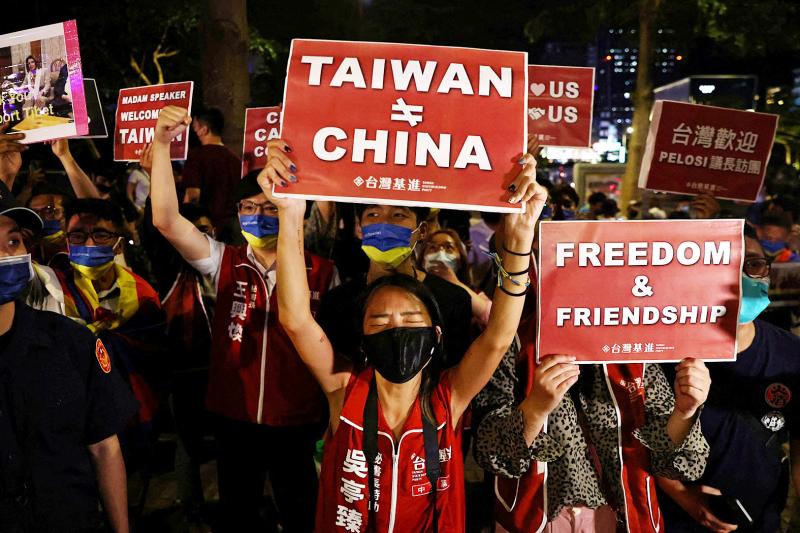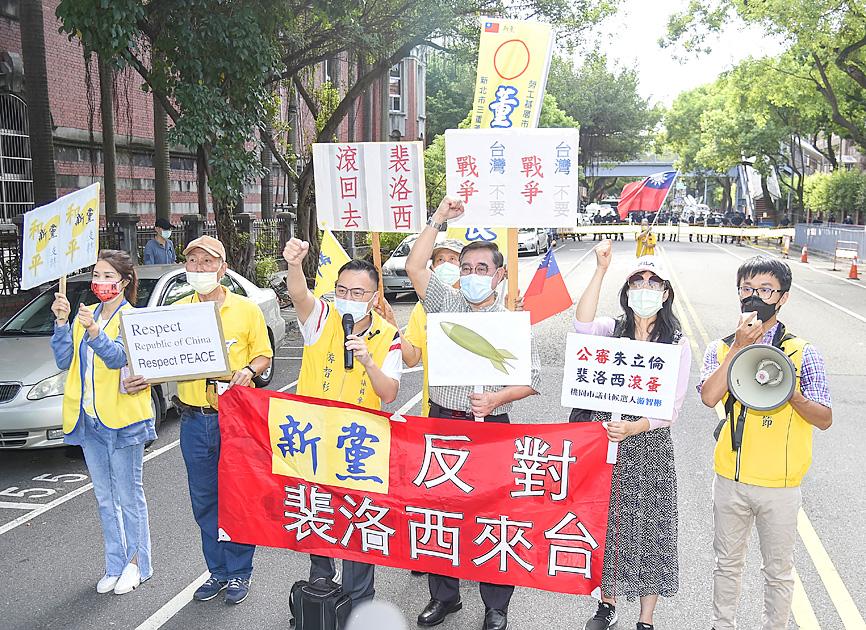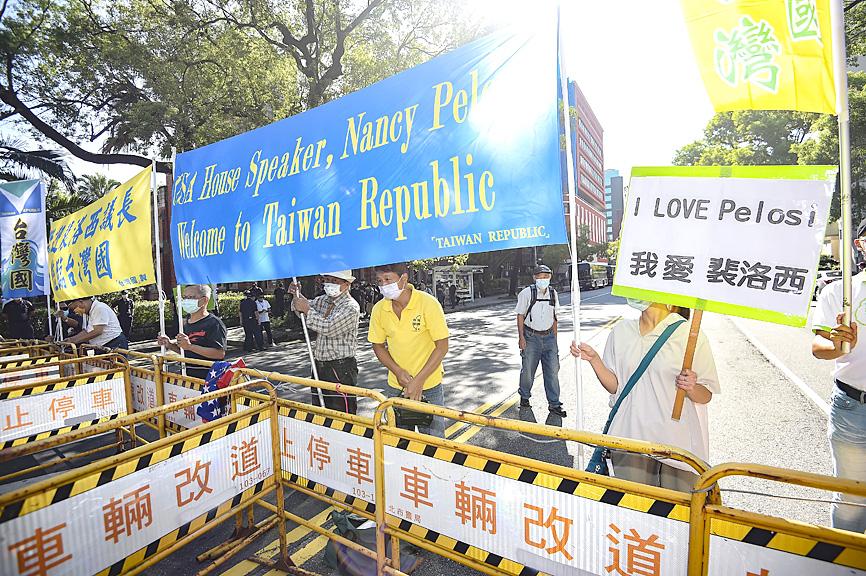Independence advocates and pro-China political parties held rival gatherings as US House of Representatives Speaker Nancy Pelosi and her delegation met with Taiwanese officials at the Legislative Yuan yesterday morning.
Members of the Taiwan Republic Office and the Nation-Building Forum waved two large US national flags and shouted slogans.
They held banners that read “USA House Speaker Nancy Pelosi, Welcome to Taiwan Republic,” as well as “Rejecting China,” and “Blessings for Taiwan,” as they rallied at Jinan Road next to the Che-lam Presbyterian Church next to the Legislative Yuan.

Photo: Ann Wang, Reuters
“Pelosi visiting Taiwan at this tense political time, and with the war in Ukraine, has enhanced Taiwan’s status among the nations of the world’s democratic alliance. She has enabled Taiwan to forge more international links and to provide mutual assistance,” Taiwan Republic chairman Chilly Chen (陳峻涵) said.
On the other side of the Legislative Yuan compound, members of the pro-China New Party and the China Unification Promotion Party (CUPP) held a rival gathering, holding banners that read “Get out! Troublemaker Nancy Pelosi” and “American witch,” while another sign written in Chinese characters called Pelosi a “toxic, deranged woman.”
CUPP founder Chang An-le (張安樂) joined the protest later.

Photo: Chen Chih-chu, Taipei Times
“Pelosi is here to elevate the US Democratic Party for [the midterm] elections and to help the election of the Democratic Progressive Party [DPP],” he said.
“Who will pay the price ? All the people in Taiwan,” Chang said.
New Party members have over the past few days said that the visit would cause war and bloodshed, and that the DPP is to blame for China’s aggression against Taiwan.

Photo: Chen Chih-chu, Taipei Times
A large police detail guarded the Legislative Yuan to protect the US delegation and prevent intruders from entering the compound.

Taiwan has received more than US$70 million in royalties as of the end of last year from developing the F-16V jet as countries worldwide purchase or upgrade to this popular model, government and military officials said on Saturday. Taiwan funded the development of the F-16V jet and ended up the sole investor as other countries withdrew from the program. Now the F-16V is increasingly popular and countries must pay Taiwan a percentage in royalties when they purchase new F-16V aircraft or upgrade older F-16 models. The next five years are expected to be the peak for these royalties, with Taiwan potentially earning

POSITIVE DEVELOPMENT: Japan and the US are expected to hold in-depth discussions on Taiwan-related issues during the meeting next month, Japanese sources said The holding of a Japan-US leaders’ meeting ahead of US President Donald Trump’s visit to China is positive news for Taiwan, former Japan-Taiwan Exchange Association representative Hiroyasu Izumi said yesterday. After the Liberal Democratic Party’s landslide victory in Japan’s House of Representatives election, Japanese Prime Minister Sanae Takaichi is scheduled to visit the US next month, where she is to meet with Trump ahead of the US president’s planned visit to China from March 31 to April 2 for a meeting with Chinese President Xi Jinping (習近平). Japan and the US are expected to hold in-depth discussions on Taiwan-related issues during the

‘LIKE-MINDED PARTNER’: Tako van Popta said it would be inappropriate to delay signing the deal with Taiwan because of China, adding he would promote the issue Canadian senators have stressed Taiwan’s importance for international trade and expressed enthusiasm for ensuring the Taiwan-Canada trade cooperation framework agreement is implemented this year. Representative to Canada Harry Tseng (曾厚仁) in an interview with the Central News Agency (CNA) said he was increasingly uneasy about Ottawa’s delays in signing the agreement, especially as Ottawa has warmed toward Beijing. There are “no negotiations left. Not only [is it] initialed, we have three versions of the text ready: English, French and Mandarin,” Tseng said. “That tells you how close we are to the final signature.” Tseng said that he hoped Canadian Prime Minister Mark Carney

STAY IN YOUR LANE: As the US and Israel attack Iran, the ministry has warned China not to overstep by including Taiwanese citizens in its evacuation orders The Ministry of Foreign Affairs (MOFA) yesterday rebuked a statement by China’s embassy in Israel that it would evacuate Taiwanese holders of Chinese travel documents from Israel amid the latter’s escalating conflict with Iran. Tensions have risen across the Middle East in the wake of US and Israeli airstrikes on Iran beginning Saturday. China subsequently issued an evacuation notice for its citizens. In a news release, the Chinese embassy in Israel said holders of “Taiwan compatriot permits (台胞證)” issued to Taiwanese nationals by Chinese authorities for travel to China — could register for evacuation to Egypt. In Taipei, the ministry yesterday said Taiwan